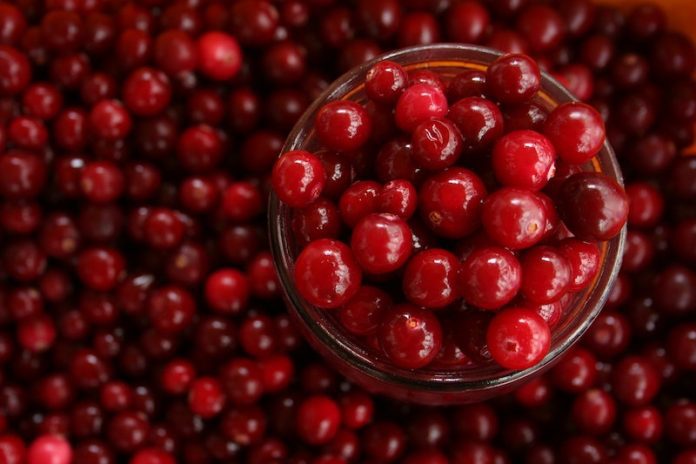
Scientists from University Düsseldorf found that daily consumption of cranberries can improve blood vessels and heart health.
Cranberry is an evergreen shrub that grows in wet habitats in the Northeastern and North Central parts of the United States.
Historically, cranberry fruits or leaves were used for bladder, stomach, and liver disorders, as well as diabetes, wounds, and other conditions.
Today, cranberry is most commonly promoted for urinary tract infections (UTIs).
Cranberry is a rich source of polyphenols including flavan-3-ols, anthocyanins, and flavonols.
It contains more polyphenols per serving (373 mg polyphenols as catechin equivalents/50 g) compared to other commonly consumed fruits such as apples, cherries, blueberries, blackberries, grapes, and strawberries.
Previous research has found heart health benefits in drinking cranberry juice.
Scientists found anthocyanins in cranberry juice may help reduce the hardening of the arteries.
Anthocyanins are colored water-soluble pigments. The pigments are in glycosylated forms. Anthocyanins responsible for the colors, red, purple, and blue, are in fruits and vegetables
Several studies also have found that cranberry juice may help reduce the chance of heart disease by improving cholesterol levels and lowering blood pressure.
However, whether daily eating whole cranberries will have sustained benefits on heart health in healthy people is unknown.
In the study, the team examined the health benefits of daily consumption of freeze-dried whole cranberry in healthy men.
They tested 45 healthy men who were assigned to 1-month daily consumption of either cranberry (9 g powder solubilized in water equivalent to 100 g of fresh cranberries) or control (9 g powder).
The researchers tested several biomarkers for blood vessel health and heart health, such as blood pressure, heart rate, blood fat, and blood sugar at the beginning and at 2 hours on day 1 and after 1 month.
They found that eating cranberries strongly increased blood vessel health at 2 h and 1 month.
They also found cranberry (poly)phenol metabolites in the participants’ plasma and urine.
Further analysis showed that cinnamic acid-4′-glucuronide, 4-hydroxybenzoic acid-3-sulfate, 2,5-dihydroxybenzoic acid, 3′-hydroxycinnamic acid, and 5-O-caffeoylquinic acid strongly affected blood vessel functions 2 hours after eating cranberries.
In addition, 3′-hydroxycinnamic acid, 4-methoxy cinnamic acid-3′-glucuronide, 3-(4′-methoxyphenyl) propanoic acid 3′-sulfate, and 3-(4′-methoxyphenyl)propanoic acid 3′-glucuronide boosted blood vessel health when the participants ate cranberries for one month.
Based on the results, the team suggests that eating whole cranberry powder every day can provide short-term and long-term health benefits to blood functions in healthy men.
These benefits are linked to specific metabolite levels in the blood.
One limitation of the study is that the team only tested younger healthy men and thus the findings may not be easily generalized to the wider population and people at a higher increased risk of heart disease.
Another limitation is that the cranberry intervention only lasted for 1 month, and the long-term benefits of eating the fruit daily are still unclear. Future work needs to address the issues.
The research is published in Food & Function and was conducted by Ana Rodriguez-Mateos et al.
Copyright © 2022 Scientific Diet. All rights reserved.








